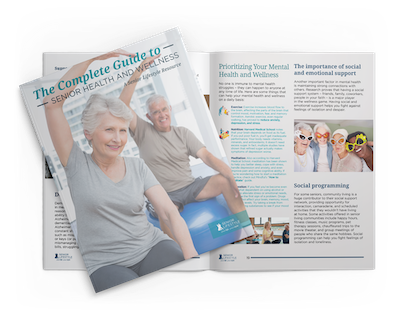A Gentle Guide To Better Hygiene For Seniors: How Caregivers Can Help

Hygiene is an essential aspect of overall health. As we age, maintaining good hygiene can become more challenging for a variety of reasons. While it’s a sensitive topic, it’s important to approach hygiene concerns with understanding and empathy.
This guide aims to provide seniors and their caregivers with practical tips to ensure that basic hygiene needs are met, promoting better health and well-being.
Why Hygiene Can Be Challenging for Seniors
Physical Limitations: Mobility issues, arthritis, and chronic pain can make it difficult for seniors to perform routine hygiene tasks such as bathing, grooming, and brushing their teeth. Limited flexibility can make reaching certain areas of the body challenging, leading to missed spots during cleaning.
Download The Complete Guide to Senior Health and Wellness
The key to living your “best life” as you age? Prioritizing your health. Check out our eBook, “The Complete Guide to Senior Health and Wellness,” to learn about the most important aspects of senior health and wellness.
Download the GuideCognitive Decline: Seniors with cognitive impairments, such as dementia or Alzheimer’s disease, may forget to perform basic hygiene tasks or may no longer understand the importance of doing so. Confusion and disorientation can also lead to resistance to bathing or other hygiene routines.
Sensory Changes: A decreased sense of smell can cause seniors to be unaware of body odor or other hygiene-related issues. Vision loss can make it difficult to see dirt or grime, leading to unintentional neglect of personal cleanliness.
Emotional and Psychological Factors: Depression, loneliness, and anxiety can reduce motivation to maintain hygiene. Some seniors may feel embarrassed or ashamed to ask for help with personal care tasks, leading to neglect of hygiene.
Financial Constraints: Limited financial resources may make it difficult for some seniors to afford personal care products, dental care, or even access to facilities where they can bathe regularly.
Common Hygiene Concerns for Seniors
Body Odor: This can be caused by infrequent bathing or changes in skin chemistry. It can be exacerbated by certain medications, diet, or underlying health conditions.
Oral Hygiene: Poor oral hygiene can lead to bad breath, gum disease, and tooth loss. If seniors have dentures, they require special care to prevent odor and discomfort.
Skin Health: Dry, flaky skin or rashes can develop due to infrequent washing or improper moisturizing. Pressure sores can occur if seniors are bedridden or sit for long periods without proper care.
Hair and Nail Care: Overgrown nails and unkempt hair can become breeding grounds for bacteria and fungus. Regular hair washing and nail trimming are essential for maintaining hygiene.
10 Tips for Maintaining Good Hygiene
1. Create a Routine
Help seniors establish a consistent daily routine that includes specific times for bathing, oral care, hair grooming, and changing into fresh clothes. Consistency can make hygiene tasks feel more manageable and less overwhelming.
Consider the senior’s preferences when scheduling hygiene activities. For instance, some might prefer to bathe in the morning to feel refreshed, while others might enjoy a bath before bed to relax.
Use visual cues like sticky notes, checklists, or phone alarms to remind seniors about their hygiene routine. These can be particularly helpful for those with memory issues.
2. Use Adaptive Tools
Provide long-handled sponges or brushes to help seniors reach areas that may be difficult due to limited mobility. An electric toothbrush can be easier to use than a manual one, especially for seniors with arthritis or hand tremors.
Consider no-rinse shampoos and body washes for seniors who find traditional bathing too challenging. These products can help maintain cleanliness between full baths or showers.
Look for easy-to-wear clothing with Velcro fastenings or zippers instead of buttons, which can be difficult for seniors with arthritis or other dexterity issues.
3. Encourage Hydration
If seniors find plain water unappealing, offer flavored water or herbal teas as alternatives to keep them hydrated.
Keep track of daily fluid intake, especially if the senior has a condition that requires careful management of hydration levels.
In addition to drinking water, applying moisturizers regularly can help prevent dry skin, which can become more common with age. Opt for gentle, fragrance-free products suitable for sensitive skin.
4. Promote Oral Care
Create a convenient dental care station with all necessary tools within easy reach, including a toothbrush, toothpaste, floss, and denture cleaning supplies.
For seniors who struggle with brushing, encourage the use of antimicrobial mouthwashes to reduce bacteria and maintain oral hygiene.
For those with dentures, ensure they are cleaned daily with a proper denture cleaner and stored in a clean, dry place when not in use. Regular checks with a dentist can help ensure a proper fit, preventing discomfort and infections.
5. Simplify the Process
Reduce clutter by simplifying the range of hygiene products used. Choose multi-functional products (for example, 2-in-1 shampoo and conditioner) to make the process quicker and easier.
Break down hygiene tasks into smaller, more manageable steps. For example, if a full shower is overwhelming, consider sponge baths as an alternative.
6. Consider Professional Help
Engage the services of a personal care assistant or home health aide if necessary. These professionals can assist with bathing, dressing, and grooming, providing both physical help and emotional support.
An occupational therapist can offer customized solutions for seniors struggling with hygiene tasks. They can recommend adaptive equipment and techniques tailored to the individual’s specific needs.
Ensure regular medical and dental checkups, which can identify any underlying health issues that may be affecting hygiene, such as skin conditions, infections, or dental problems.
7. Create a Comfortable Environment
Ensure that the bathroom is equipped with safety features like grab bars, non-slip mats, and shower chairs to make bathing safer and more comfortable.
Maintain a warm and comfortable temperature in the bathroom to encourage regular bathing. Cold environments can be a deterrent, especially for seniors who are sensitive to temperature changes.
Personalizing the bathroom with familiar scents, colors, and decorations can make the space more inviting, reducing anxiety and promoting a sense of comfort during hygiene routines.
8. Be Patient and Supportive
Approach hygiene-related conversations with empathy, recognizing that these tasks can be challenging and sometimes embarrassing for seniors. Use positive reinforcement and praise for efforts rather than focusing on what might be lacking.
Involve the senior in decisions about their hygiene routine, respecting their preferences and autonomy as much as possible. This can empower them to take an active role in their care.
Providing choices, such as selecting preferred hygiene products or deciding the time of day for bathing, can give seniors a sense of control and reduce resistance to care.
9. Promote Physical Activity
Regular physical activity can improve circulation, flexibility, and overall health, making it easier for seniors to manage their hygiene. Simple exercises like stretching or walking can make a significant difference.
Engage in gentle exercises that promote mobility and strength, such as yoga or tai chi, which can help seniors maintain the physical ability to perform hygiene tasks independently.
10. Address Emotional Well-being
Encourage activities that boost self-esteem and well-being, such as dressing in clothes that make the senior feel good or engaging in social interactions. A positive self-image can motivate better hygiene habits.
Address any underlying mental health issues, such as depression or anxiety, that may be contributing to neglect of hygiene. Professional counseling or support groups can be beneficial.
Get the Support You Need at a Senior Lifestyle Community
Maintaining good hygiene is crucial for seniors’ health and well-being, but it can be challenging due to various physical, cognitive, and emotional factors. By understanding these challenges and offering practical support, caregivers can help seniors maintain their dignity and quality of life.
Senior Lifestyle communities can help seniors, and their family members, live a worry-free life while we take care of the everyday needs of living, such as laundry, cleaning and meal preparation.
Find out more about Senior Lifestyle or schedule a visit today.
The post A Gentle Guide to Better Hygiene for Seniors: How Caregivers Can Help appeared first on Senior Lifestyle.


